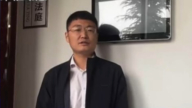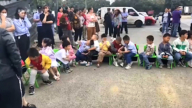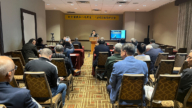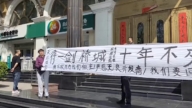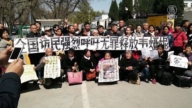【新唐人2013年05月28日訊】中共喉舌媒體近期發表一篇題為《底層上升通道受阻,一代窮世代窮》的文章,引發大陸十萬網民的討論。文章強調中國底層無法上升,社會階層固化加劇的主要原因是城鄉教育不均衡,但這個結論遭到網民的反駁。而社會問題專家指出,中共特權制度和權貴世襲制,才是造成階級分化的主要原因。
《人民日報》提出,因為大陸城鄉教育資源的不均衡,和競爭不公平,導致大量農村學子放棄高考,造成了底層向上的通道越來越窄,社會階層固化趨勢加劇,貧窮將會代際傳遞,一代窮,世代窮。
但一位網民說:「一代紅,後代紅,一代有權,世代有權,它們利用這些權力阻止窮人享受,才是根本原因。」
時事評論員林子旭:「現在中國底層民眾的貧窮,城市、農村都差不多。中國社會現在非常的不平等,絕大部分社會資源都被控制在中共官員手裡,這些人的親朋好友幾乎搶佔了中國社會的所有機會,普通百姓家的孩子拿甚麼和這些人爭啊?要說底層上升通道受阻,那最大的障礙不是別的,恰恰就是中共權貴階層。」
時事評論員林子旭還指出,現在大陸底層的民眾不僅僅是很難找到發跡的機會,就連最基本的「生存權」都很難保障。舉例說﹕中共官員和太子黨們都吃「特供」,而老百姓餐桌上卻是各種「毒食品」,底層民眾連健康和身體素質都和權貴們拉開了差距,社會底層家庭的孩子就更難翻身了。
另外,《法國國際廣播電臺》在《中國特權制度亟待改革》文章中也指出,特權階層大量消耗甚至浪費著最大量的公共資源,使得社會政策的確立越來越困難。世界上沒有一個國家像中國一樣,有那麼多人爭當公務員,因為這個群體在眾多領域享受著無窮的好處,而「高幹群體」更是無需通過市場交易來維持生活,對他們來說,國庫就是私人銀行。
外界評論中共內政的三種手段,包括﹕維穩、世襲、搞特權。評論說,如果中共特權造成了資源和貧富的兩級分化,那麼特權的世襲,則徹底的堵死了中國百姓上升的通道。
香港《蘋果日報》指出,中共權力世襲有三大特點:
第一是﹕「輿論護航」,中共組織部和宣傳部,負有使「紅二代」們免受輿論轟炸的任務。
第二是﹕「官商通道暢通」,而普通大學生要想加入公務員,卻好像和千軍萬馬爭獨木橋。
第三是﹕不同代領導人的子女,世襲的分級清晰,隱隱排成接班梯隊。如中共第二代領導人鄧小平、陳雲等,子女擔任國家領導人。第三代的江澤民、李鵬等子女擔任省部長,如山西省長李小鵬﹔而第四代的胡錦濤、吳邦國等子女擔任司、局長。
《蘋果》認為,以上三大特點顯示了中共的權力世襲潮,不是個別領導人的個人行為,而是有共識、有計劃的集體行動。
旅美中國社會問題研究人士張健:「如果他不搞世襲制,有可能他就會相信,因為沒有這種血緣關係,這個政權就會徹底的瓦解。所以,共產黨會把各個利益集團都強加在一起,擰成一股繩。在這種情況下,共產黨還會認為他們有一定的安全性、有一定的可保證性。」
《法廣》的文章指出,中國特權制度最終不得不改革,如果晚改,有可能導致財政和政治的雙重危機,甚至失去改革的危機,而演變成革命。
採訪/常春 編輯/張天宇 後製/李若琳
Hereditary privileges in China, Grassroots have no chance be highly promoted
An official commentary regarding the passing-on
of poverty that exists among the grassroots in China
has sparked a heated debate involving
100,000 Chinese netizens.
The article alleges that the main cause
of the grassroots’ lack of promotion opportunities
and the widened social stratification
is unbalanced education in cities and rural areas.
The view has been widely refuted by netizens.
Experts on social issues indicate that China’s
social stratification is mainly caused by the privilege system
and the hereditary power succession system
of the Chinese Communist Party (CCP).
The CCP mouthpiece, the People’s Daily, suggests
that there exist unbalanced educational resources in China’s cities and rural areas.
This, along with unfair competition, has caused
great numbers of rural students to give up on their college entrance examinations.
As a result, these have reduced chances for the grassroots’
promotion, and widened social stratification.
The article says that rural residents will remain in poverty
which will be passed down to their future generations because of this.
In contrast, a netizen posted, “A revolutionary father
can make his future generations all enjoy privileges.
They used these powers to block the poor from
enjoying their rights, which is the root cause.”
(Critic) Lin Zixu: “Currently, the poverty of the grassroots
in cities and in rural areas is almost the same.
Inequality can be seen everywhere in China.
The CCP officials have controlled the vast majority
of the social resources.
Their relatives and friends have grappled
nearly all opportunities in China.
How can ordinary people’s children compete with them?
Speaking of the blocked promotion opportunities,
the biggest obstacle is the CCP privileged group.”
Lin Zixu indicates that by now, the grassroots in China
have hardly safeguarded their basic rights of subsistence.
For example, the CCP officials and princelings
have all enjoyed custom-made food.
In contrast, the civilians eat contaminated food daily.
That’s a widening gap in health and physical fitness
between the grassroots and the privileged group, let alone the personal growth chance for the rural children.
Radio France Internationale (RFI) commented
on China’s privilege system.
It said that the privileged classes have vastly consumed
and wasted the maximum amount of public resources.
This has made it more difficult to establish social policies.
No country in the world like China has so many
people to compete for a civil service position.
This is because civil servants in China can gain numerous
benefits, whilst the group of CCP high-ranking officials
can enjoy their happy lives by getting money from
the state treasury, their private bank.
Media have commented on the CCP’s three approaches
taken in its governance—stability preservation, nepotistic rule, and enjoying privileges.
According to the comments, the CCP officials’ privileges
have polarized the rich and poor.
Their hereditary privilege succession has completely blocked
opportunities for the grassroots to develop in society.
Hong Kong’s Apple Daily have said that the CCP’s
hereditary power succession has three features.
The first is being protected from public criticism;
the CCP Central Organization Department and
Propaganda Department have duties to protect
the CCP princelings from public criticism.
The second is that they are given smooth paths
to become officials and doing business;
In contrast, ordinary college students have to get through
extremely fierce competition to obtain a civil service job.
The third is that there is a clear caste system of hereditary
power succession for example, Deng Xiaoping and Chen Yun
were the 2nd generation of CCP leaders.
Their children have been appointed state leaders.
Jiang Zemin and Li Peng were the 3rd generation,
their children have taken posts at the provincial level.
Li Xiaopeng, Li Peng’s son, is governor of Shanxi province.
The 4th generation covers Hu Jintao, Wu Bangguo,
and other CCP leaders.
Their children have served as sub-ministry department chiefs
and department directors.
Apple Daily stated that the three features show
the CCP’s hereditary power succession is not
some specific leaders’ individual acts,
rather, it is a planned collective action under consensus.
US-based researcher specializing in China issues, Zhang Jian:
“The CCP views this hereditary system as a kind of kinship.
It believes that without it, its rule will end.
So the CCP has stuck all interest groups (together),
and twisted them into a rope, to increase security.”
RFI says that a reform on China’s privilege system
will eventually be carried out.
If it occurs late, it may lead to financial and political crises,
and even evolve into a revolution.


